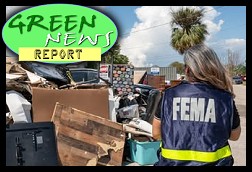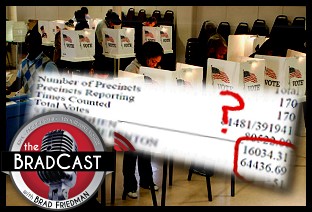 As noted at the top of today's BradCast, it's worth buckling up before listening. [Audio link to show follows below.]
As noted at the top of today's BradCast, it's worth buckling up before listening. [Audio link to show follows below.]
We begin, gently enough, with the news of California's Supreme Court temporarily nixing a billionaire's statewide initiative from this November's ballot which, if adopted, would split the state into three. We explain why the Court removed the measure, for now, thanks to a challenge by an environmental group.
Then, with Donald Trump's own Director of National Intelligence, Dan Coats, warning this past week that "the system is blinking red" in a way that hasn't been seen since just before the 9/11 attacks, the multiple and ever-changing positions by the President of the United States in recent days, regarding whether Russia interfered in the 2016 election and is actively doing so in advance of the 2018 midterms, is all the more head-spinning. Coats was referencing warning signs being reported by U.S. intelligence agencies regarding ongoing attacks and intrusions on America's critical infrastructure --- including our wildly vulnerable electoral systems.
Moreover, new reporting on Trump being read into explicit source details weeks before he was inaugurated in early 2017 regarding Russia's alleged 2016 election intrusion measures, make his ongoing denials, ever-changing positions, and dizzying White House spin to explain them all following Monday's summit with Putin in Helsinki, all the more bewildering. Nonetheless, his own intelligence apparatus and appointees continue to contradict the President, even as the GOP-controlled Congress fails to take any substantive action to either place a check on Trump or even to help protect this November's crucial elections.
At the same time, after the FBI informed Maryland just days ago that its entire election system was being hosted on a private commercial server said to be owned by a Russian oligarch tied to Putin (as discussed in detail on yesterday's BradCast), we learn this week that the top U.S. election system vendor, ES&S, has been lying about remote access software and modems installed, for many years, on systems still used by a majority of U.S. voters.
The new revelations may help explain an exclusive special report published by The BRAD BLOG back in 2011, with an officially-commissioned independent analysis finding that, among other concerns, Venango County, Pennsylvania's ES&S election management system had been accessed by an unknown and unauthorized computer for "several hours" from a remote location. As we reported at the time, ES&S and the County's Board of Commissioners went to considerable lengths, after those revelations, to block a further, independent forensic analysis of the system.
And now, perhaps, we may know why. Kim Zetter reports this week at Vice's Motherboard that the company lied to her and New York Times' fact-checkers earlier this year in advance of her February article at the paper on the inclusion of modems and pcAnywhere remote access software included with the election management systems sold to customers from 2000 to 2006. After previously insisting the company had no "knowledge that our voting systems have ever been sold with remote-access software", ES&S reversed itself in a letter to U.S. Senator Ron Wyden, she reports. But they have refused to respond to the Senator's subsequent follow-up queries or to appear at recent Senate hearings on U.S. election system vulnerabilities.
As Zetter details, pcAnywhere was found to include multiple and serious vulnerabilities over the years, which would have allowed unauthorized intruders to change election results with little chance of detection. Moreover, she explains, many questions remain about why ES&S lied, which jurisdictions around the nation may still feature the same, easily-exploitable flaws, and about electronic voting and tabulation systems manufactured by the nation's other top vendors, believed by expert to likely have included similar remote-access vulnerabilities.
All of that (and more, including our latest Green News Report), just over three months out from this November's midterm elections. Told you to buckle up...
(Snail mail support to "Brad Friedman, 7095 Hollywood Blvd., #594 Los Angeles, CA 90028" always welcome too!)
|


 Dems Step Up: Crawford Landslide in WI; Booker Makes History in U.S. Senate: 'BradCast' 4/2/25
Dems Step Up: Crawford Landslide in WI; Booker Makes History in U.S. Senate: 'BradCast' 4/2/25 Judge Dismisses Long-Running Challenge to GA's Unverifiable, Insecure E-Vote System: 'BradCast' 4/1/25
Judge Dismisses Long-Running Challenge to GA's Unverifiable, Insecure E-Vote System: 'BradCast' 4/1/25 'Green News Report' 4/1/25
'Green News Report' 4/1/25
 Bad Court and Election News for Trump is Good News for America: 'BradCast' 3/31/25
Bad Court and Election News for Trump is Good News for America: 'BradCast' 3/31/25 Sunday 'Great Start!' Toons
Sunday 'Great Start!' Toons Vets Push Back at Trump, Musk Plan to Slash Health Care, 80K V.A. Jobs: 'BradCast' 3/27/25
Vets Push Back at Trump, Musk Plan to Slash Health Care, 80K V.A. Jobs: 'BradCast' 3/27/25 'Green News Report' 3/27/25
'Green News Report' 3/27/25 Signal Scandal Worsens for Trump, GOP; Big Dem Election Wins in PA: 'BradCast' 3/26
Signal Scandal Worsens for Trump, GOP; Big Dem Election Wins in PA: 'BradCast' 3/26 'Emptywheel' on Why Trump NatSec Team Should 'Resign in Disgrace' After Signal Chat Debacle: 'BradCast' 3/25/25
'Emptywheel' on Why Trump NatSec Team Should 'Resign in Disgrace' After Signal Chat Debacle: 'BradCast' 3/25/25 'Green News Report' 3/25/25
'Green News Report' 3/25/25 USPS 'Belongs to the People, Not the Billionaires': 'BradCast' 3/24/25
USPS 'Belongs to the People, Not the Billionaires': 'BradCast' 3/24/25 Sunday 'Suddenly Conceivable' Toons
Sunday 'Suddenly Conceivable' Toons 'Green News Report' 3/20/25
'Green News Report' 3/20/25 We're ALL Voice of America Now: 'BradCast' 3/20/25
We're ALL Voice of America Now: 'BradCast' 3/20/25 What Trump's 'Timber Production Expansion' Means (and Costs): 'BradCast' 3/19/25
What Trump's 'Timber Production Expansion' Means (and Costs): 'BradCast' 3/19/25 Courts Largely Holding Against Trump, Musk Lawlessness: 'BradCast' 3/18/25
Courts Largely Holding Against Trump, Musk Lawlessness: 'BradCast' 3/18/25 Chief VOA Reporter on Outlet Falling Silent First Time Since 1942: 'BradCast' 3/17/25
Chief VOA Reporter on Outlet Falling Silent First Time Since 1942: 'BradCast' 3/17/25 Trump EPA Unveils Plans to Endanger, Sicken Americans: 'BradCast' 3/13/25
Trump EPA Unveils Plans to Endanger, Sicken Americans: 'BradCast' 3/13/25 Trump Nixed Enforce-ment Against 100 Corp. Lawbreakers: 'BradCast' 3/12/25
Trump Nixed Enforce-ment Against 100 Corp. Lawbreakers: 'BradCast' 3/12/25 Bad Day for 'Strongmen': 'BradCast' 3/11
Bad Day for 'Strongmen': 'BradCast' 3/11 WI Election Could Flip Supreme Court Control, Musk Jumps In: 'BradCast' 3/10
WI Election Could Flip Supreme Court Control, Musk Jumps In: 'BradCast' 3/10
 VA GOP VOTER REG FRAUDSTER OFF HOOK
VA GOP VOTER REG FRAUDSTER OFF HOOK Criminal GOP Voter Registration Fraud Probe Expanding in VA
Criminal GOP Voter Registration Fraud Probe Expanding in VA DOJ PROBE SOUGHT AFTER VA ARREST
DOJ PROBE SOUGHT AFTER VA ARREST Arrest in VA: GOP Voter Reg Scandal Widens
Arrest in VA: GOP Voter Reg Scandal Widens ALL TOGETHER: ROVE, SPROUL, KOCHS, RNC
ALL TOGETHER: ROVE, SPROUL, KOCHS, RNC LATimes: RNC's 'Fired' Sproul Working for Repubs in 'as Many as 30 States'
LATimes: RNC's 'Fired' Sproul Working for Repubs in 'as Many as 30 States' 'Fired' Sproul Group 'Cloned', Still Working for Republicans in At Least 10 States
'Fired' Sproul Group 'Cloned', Still Working for Republicans in At Least 10 States FINALLY: FOX ON GOP REG FRAUD SCANDAL
FINALLY: FOX ON GOP REG FRAUD SCANDAL COLORADO FOLLOWS FLORIDA WITH GOP CRIMINAL INVESTIGATION
COLORADO FOLLOWS FLORIDA WITH GOP CRIMINAL INVESTIGATION CRIMINAL PROBE LAUNCHED INTO GOP VOTER REGISTRATION FRAUD SCANDAL IN FL
CRIMINAL PROBE LAUNCHED INTO GOP VOTER REGISTRATION FRAUD SCANDAL IN FL Brad Breaks PA Photo ID & GOP Registration Fraud Scandal News on Hartmann TV
Brad Breaks PA Photo ID & GOP Registration Fraud Scandal News on Hartmann TV  CAUGHT ON TAPE: COORDINATED NATIONWIDE GOP VOTER REG SCAM
CAUGHT ON TAPE: COORDINATED NATIONWIDE GOP VOTER REG SCAM CRIMINAL ELECTION FRAUD COMPLAINT FILED AGAINST GOP 'FRAUD' FIRM
CRIMINAL ELECTION FRAUD COMPLAINT FILED AGAINST GOP 'FRAUD' FIRM RICK SCOTT GETS ROLLED IN GOP REGISTRATION FRAUD SCANDAL
RICK SCOTT GETS ROLLED IN GOP REGISTRATION FRAUD SCANDAL VIDEO: Brad Breaks GOP Reg Fraud Scandal on Hartmann TV
VIDEO: Brad Breaks GOP Reg Fraud Scandal on Hartmann TV RNC FIRES NATIONAL VOTER REGISTRATION FIRM FOR FRAUD
RNC FIRES NATIONAL VOTER REGISTRATION FIRM FOR FRAUD EXCLUSIVE: Intvw w/ FL Official Who First Discovered GOP Reg Fraud
EXCLUSIVE: Intvw w/ FL Official Who First Discovered GOP Reg Fraud GOP REGISTRATION FRAUD FOUND IN FL
GOP REGISTRATION FRAUD FOUND IN FL



















 It was another wildly busy
It was another wildly busy  On today's
On today's  [An earlier version of this article was
[An earlier version of this article was  On today's
On today's  Our elections are under attack. Intelligence officials concur that Russia plans to target the 2018 midterm elections.[1] One hundred experts in the fields of computer science and statistics have recommended paper ballots and post-election statistical audits to protect our democracy.[2] But some election officials have undermined efforts to implement these security measures with irresponsible and false assurances that it would be difficult for hackers to alter the outcome of a national election under our current system.[3]
Our elections are under attack. Intelligence officials concur that Russia plans to target the 2018 midterm elections.[1] One hundred experts in the fields of computer science and statistics have recommended paper ballots and post-election statistical audits to protect our democracy.[2] But some election officials have undermined efforts to implement these security measures with irresponsible and false assurances that it would be difficult for hackers to alter the outcome of a national election under our current system.[3] On today's
On today's  As we note on more than one occasion on today's
As we note on more than one occasion on today's  It's that time of the election cycle again. Happens every four years. (Every two, actually.) On today's
It's that time of the election cycle again. Happens every four years. (Every two, actually.) On today's  On today's
On today's  Please read the cover story of Politico Magazine today headlined
Please read the cover story of Politico Magazine today headlined  On today's
On today's  On today's
On today's  We've got a lot to cover on today's
We've got a lot to cover on today's  And so begins our traditional, biennial (if not more frequent) coverage of partisans understandably freaking out when their 100% unverifiable touch-screen votes are seen flipping on screen from a candidate or candidates of their preferred party to a candidate or candidates from a different party.
And so begins our traditional, biennial (if not more frequent) coverage of partisans understandably freaking out when their 100% unverifiable touch-screen votes are seen flipping on screen from a candidate or candidates of their preferred party to a candidate or candidates from a different party.













